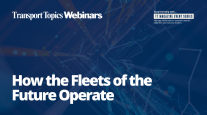Opinion: Could Data-Driven Technology Lead the Trucking Industry to Nirvana?
The trucking industry has hit a few roadblocks in recent times. Driver shortages, increased competition from outside the industry and slow acceptance of technological advances are just a few of the hurdles that have brought stagnancy to our sector. The only way for us to overcome these challenges and spur growth is to innovate through collaboration — which is easier said than done, given the independent nature of the transportation and logistics industries.

Leonard
Innovation, in the form of new applications that are based on recent technological advancements, such as blockchain and predictive analytics, will help shape the future of fleet management. Predictive and proactive analytics are aspects of “deep learning” that can optimize fleet operations, such as making routes more efficient and alerting management when equipment needs maintenance.
Technological innovation is meaningful only when it manifests in applied innovation; the kind that makes a difference for all of us — carriers, warehouse managers and final-mile fleets, among others. In other words, it has to deliver value today.
Right now, there’s a disconnect that doesn’t allow for blockchain and deep analytics to be applied optimally. To address this, we all must collaborate.
To overcome the challenges that continue to plague trucking, companies across the industry must work toward greater collaboration, including finding standard practices that suit all parties and convincing business leaders to buy into the technology that will revolutionize the transportation industry. The goal is to bring the transportation sector — starting in North America — up to the standards that other countries are currently setting by embracing new, impactful technologies, such as blockchain and business intelligence.
Critics of the U.S. transportation system say that this lack of collaboration is due to the individualistic nature of our society. They claim U.S. companies always will look out for themselves first — arguing that it’s the nature of capitalistic competition.
In this regard, Africa, Russia and China stand in stark contrast to the United States. The collectivist, hive-minded nature of their societies enables more of a focus on what is better for everyone involved. In somewhat of a backhanded slight, these nations often encourage us to continue to focus on social media technology or video-sharing technology and leave the advancement of “real” innovation to them — namely, that which will drive global economic growth, such as blockchain-driven applications.
New technology is forcing fleet managers to plan for the future, and the government needs to regulate factors that have only just emerged, such as blockchain. For example, in its 2017 five-year plan, Chinese policymakers set a framework and standards to accelerate the transportation industry’s adoption of blockchain technology. By contrast, U.S. legislatures have not even discussed such a concept of collaboration in terms of government-led policy.
We must work to encourage the U.S. government to develop policies to promote standards in blockchain. Groups such as the Blockchain in Transport Alliance, or BiTA, and the Blockchain Engineering Standards for Transportation and Logistics, or BEST-L, are working to reform the reputation of collaboration within the transportation and logistics industries here in the United States.
In the interests of full disclosure, Trimble’s TMW Systems is a charter member of BiTA, and founded BEST-L. We are working to meet early industry standards borne out by collaboration in organizations like these, so we can share best practices. Because if we don’t work hard on open collaboration, our industry will remain stagnant.
As we stand here today, it’s difficult to envision this level of transparency in our industry. That’s why the mission of groups like these is so important. Industry leaders owe it to themselves to work together to help realize the full potential of data-driven technology through a spirit of collaboration, so this great industry can flourish even more and provide customers with technological solutions to help them make crucial business decisions.
There is no doubt that technologies such as deep analytics and blockchain hold great promise for our industry. Whether it’s predictive analytics to avoid unplanned maintenance or blockchain ledgers that make contracting among parties more consistent and transparent, technology developed using standards created collaboratively is our best hope for the future.
Timothy Leonard is executive vice president and chief technology officer of Trimble Transportation Enterprise Solutions. The former executive at General Motors and CTO and VP of Information Management at US Xpress Inc. has more than 27 years’ experience in configuration management planning for information management systems, operational data stores and order entry. TMW (www.tmwsystems.com) is a transportation software provider to commercial and private fleets, freight brokerage and 3PL organizations.




